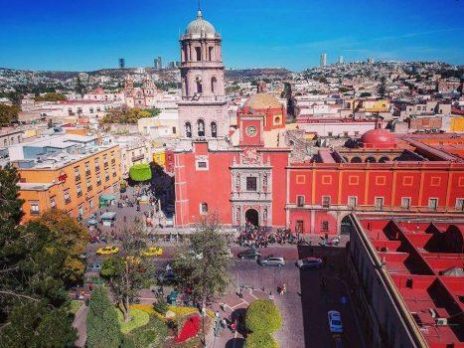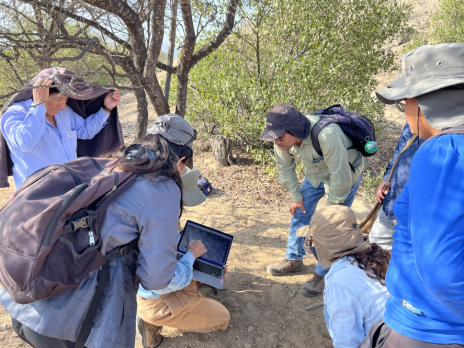Latin American Studies
Study Abroad with Latin American Studies
Study Abroad in Costa Rica
Experience more with NAU’s International Immersion Program (IIP) in Costa Rica. This unique program is set in one of the most beautiful, welcoming, and diverse countries in Latin America. Soak up the sights and sounds of bustling San José and experience the lush beauty of Costa Rica’s cloud forests and beaches. There is a reason why Costa Rica was ranked #1 amongst countries that offer the happiest and most sustainable lives in 2021, according to the Happy Planey Index. Even more, Costa Rican Spanish is said to be among the easiest to understand, and makes an ideal location for second language learners.
All in all, from the culture to the volcanoes, the people to the language, with Costa Rica NAU, you live it all. Pura vida!

Study Abroad in Mexico
Experience more with the NAU International Immersion Program (IIP) in Querétaro, Mexico. This unique program is designed for you to learn Spanish through immersion. You can take beginning or advanced Spanish courses, learn about the region’s influence in Mexico’s history, all while experiencing Mexico’s gastronomy, culture, and architecture. This makes Mexico the ideal location to begin/continue your Spanish language studies, as the pronunciation, vocabulary, and colloquial expressions used in Mexico are also commonly heard in the U.S., offering you a smoother linguistic transition between the two countries. You will study at Querétaro’s premier language learning institute Olé, which is close to Querétaro’s beautiful historic district. As part of the immersive experience, you will live with a Mexican host family and have the chance to interact with Mexican citizens on a daily basis.

NAU in Peru: Archaeology and Ecology Field School
This year, PIAGN will focus on the site known as Huaca Letrada, one of the earliest regional centers of the La Leche valley, Lambayeque, Peru, an area that came to host the site of Tambo Real, one of several stops along the Inka trail system that spans the entirety of Peru. In this unique cultural and ecological region of the world, our upcoming interdisciplinary fieldwork will focus on locating origin point of ancient canals, metal and pottery workshops, and households used by ancient people. Students will gain experience in non-destructive drone-based archaeological survey and the use of machine learning in archaeological fieldwork.
As a participant, you will learn to systematically excavate an archaeological site, analyze artifacts and curate them, and conduct public outreach all while working alongside experienced Peruvian professionals. On weekends, you will travel. You will visit the Pacific coast where traditional fisherfolk sell the daily catch along the beaches of Pimentel, and journey to a Quechua-speaking community living in the Andean highlands over 10,000 feet in elevation where traditional weavers are reclaiming their cultural heritage. You will learn about the colonization of Peru by the Spanish as we travel to the Colonial city of Trujillo where Peru’s independence from Spain was proclaimed in 1820. You will also visit several world-renown archaeological sites and museums in northern Peru. Finally, reflecting the diverse cultural background and rich natural resources of the region, you will enjoy a wide array of dishes prepared by our regionally well-known chef who has long served us healthy and delicious authentic Peruvian cuisine.
Minor in Latin American Studies | 2023-2024 Catalog
Learn, study, travel and experience the art, music, language, history, and politics of Latin America.
Students examine important topics related to culture, ideology, and power in the individual countries of the region and develop their own specific areas of expertise. This minor encourages creative thinking and prioritizes experiential learning as the rich cultural diversity of Latin America is explored. Spanish language facility is encouraged but not required for this plan.
A minor is earned in conjunction with a bachelor’s degree.
- You can count any course that focus on Latin America towards the minor. Choose course from the following areas and more:
- Anthropology
- History
- Politics
- Spanish or Portuguese
- Business
- Cultural Studies
- Literature
- Art History
- Film and Media
- Sociology
- Geography
- Environmental Studies
- Communication
- Nursing and Medicine
- Religion
- Indigenous Studies
- Music
- Humanities
- Borderlands
To receive any minor (18 – 24 units) at Northern Arizona University, you must complete a planned group of courses from one or more subject matter areas (like Latin America) with a cumulative grade point average of at least 2.0.
At least 12 units of the minor must be unique to that minor and not be applied to any other minor.
Students may be able to use some courses to meet more than one requirement. Contact your advisor for details.
No more than fifty percent of the units used to satisfy minor requirements may be used to also satisfy major requirements.
Your 18 credits must come from three different areas, for example Anthropology, History, and Music, or Political Science, Spanish, and Latin American Studies, or event Comparative Cultural Studies, Sociology, and Women and Gender Studies.
Why do we suggest Latin American Studies?
Latin American Studies will provide you with a broad picture of the Latin American region through coursework from many different departments primarily in the College of Arts and Letters and the College of Social and Behavioral Sciences. You will:
- Learn about the cultures and languages of latin American regions, nations, ethnic communities, and religious communities
- Learn about the key periods in Latin American history; the major artistic, cultural and political trends of each period, and the relationships between these historical periods
- Analyze a variety of texts from Latin American arts, cultures, politics and histories, and effectively express your understanding of these in written and oral formats.
- Describe and assess the influence and impact of conquest, colonization, slavery, dependency, civil unrest, political turmoil, foreign intervention and globalization on the political and economic stability and the social and cultural integrity of Latin American nations
Minor Requirements
- Take 18 units from the following choices, or others that focus on Latin America
- LAS 101 (3 units minimum)
- Select from the following options, in at least three different disciplines (15 units):
*Denotes topics courses; only the topics related to Latin America are approved for the minor. Please consult with your advisor.
We strongly recommend that you select electives in the Spanish language because linguistic familiarity is essential to a full appreciation of the Latin American region.
Be aware that some courses may have prerequisites that you must also take. For prerequisite information click on the course or see your advisor.
Latin American Studies Committee
Our goal is to help develop cultural awareness and cultural diversity at the university and in society. The Latin American Studies Committee focuses on ties between the Southwest, the border regions, and Latin America. The committee promotes lectures, films, performing arts, and other cultural events related to Latin America. These activities provide students and the greater Flagstaff community with information on Latin American arts and culture, history, politics, economics, and environmental issues.
To support the university’s academic goals, the Latin American Studies Committee promotes and serves an interdisciplinary minor in Latin American Studies. The minor aims to provide a broad cross-disciplinary familiarity with the Latin American region through course work in the following areas: anthropology, Chicano/Latino studies, comparative literature, economics, geography, history, humanities, political science, religious studies, Spanish, and women’s studies.

